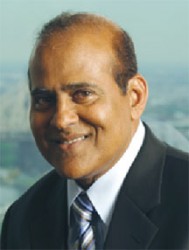Former Auditor General Anand Goolsarran has defended the restricted tendering of audits by the government for state entities arguing that time is of the essence and these are essentially stocktaking exercises.
Goolsarran is one of a number of accountants in the private sector who have been hired by the new APNU+AFC administration to undertake audits of around 30 entities including high-profile agencies like the National Industrial and Commercial Investments Limited (NICIL) and the Guyana Geology and Mines Commission (GGMC). Critics have said that there should have been open tendering and these audits should have come under the aegis of the Office of the Auditor General.
Writing in his accountability column in Monday’s Stabroek News, Goolsarran contended that there are a limited number of Chartered Accounting firms in the country, and not all of them offer forensic auditing services. Further, he noted that forensic auditing does not require one to be in possession of a practicing certificate from the Institute of Chartered Accountants of Guyana as the results of such audits do not require the expression of an opinion on the financial statements of an entity.

He also argued that time is of essence since the new Admin-istration wants to have the results in as quickly as possible so as to draw a line under many of the issues that are in the public domain relating to some of the entities being audited. He said that if the open tender process is used it would take approximately two months for the exercise to begin since there is a minimum period that must be allotted for advertising, the receipt and opening of bids, and their assessment before the contracts are awarded.
In addition to the delays that could arise, Goolsarran also pointed to the cost implications involved and that the results are unlikely to be different from the restricted tender approach which is catered for under the Procurement Act.
“It is also important to note that a key outcome of the forensic audit exercise is an assessment of the extent to which there have been deviations from established criteria, the implications of such deviations, and what needs to be done to remedy the situation. It is a kind of stocktaking exercise to enable the new Administration to move forward as quickly as possible”, he stated.
Noting that concerns have been raised that since some auditors had been previously critical of the operations of some entities they should be excluded from these audits, Goolsarran said this is a misplaced belief.
“…these are professionals, some with international standing, who are trained to put aside any bias they may have, and be as objective as possible. They are also required to follow the International Standards on Auditing …and other related standards. In addition, the audit process does not allow for any bias to take precedence, Goolsarran asserted. Goolsarran is presently auditing NICIL and has been singled out as one of those who has severely criticised the operations of NICIL for a number of years.
Goolsarran also pointed out that there is a difference between the forensic auditing being done of the state entities and the forensic auditing mandate of the auditor general’s office.
He said that Section 8 of the Regulations made under the Audit Act age 2004 provides for the Auditor General to establish a Forensic Audit Unit. “This is an internal arrangement whereby, during the course of a normal audit, an irregularity has been uncovered, the matter is referred to the Unit for further investigation. Where it is established that a criminal offence has been committed, the Auditor General must refer the matter to the Director of Public Prosecutions, copied to the Commissioner of Police for appropriate action…
“The work of the Audit Office’s Forensic Audit Unit is not the same as the forensic audits currently being undertaken. The Minister of Finance explained that he had discussions with Auditor General, and they both agreed that the Audit Office should not be burdened with this exercise so as to enable it to concentrate on its core mandate of auditing of the public accounts and reporting to the Legislature”, Goolsarran pointed out.
Goolsarran also noted that a concern has been raised as it relates to the arrangement whereby the Auditor General can contract the services of Chartered Accountants in public practice to audit the accounts of an entity on his behalf. Goolsarran asserted that Section 18 of the Audit Act states that in the conduct of his functions, the Auditor General may engage the services of technical experts and Chartered Accountants in public practice to serve on a contract basis for limited audit engagements.
Goolsarran stated that the Auditor General is the external auditor of the public sector and his functions cohere mainly to the audit of the public accounts of Guyana and reporting to the Legislature.
“The forensic audits initiated by the Government in no way impinges on the Auditor General’s mandate as they do not relate to examining a set of financial statements and expressing an opinion on them. Rather, these audits are managerial in nature and the related reports are to be submitted to the Minister of Finance, and not the Legislature. That apart, the contracting out arrangements also takes time since the procedures are the same as open tendering, a luxury which the new Administration cannot afford”, Goolsarran said.









